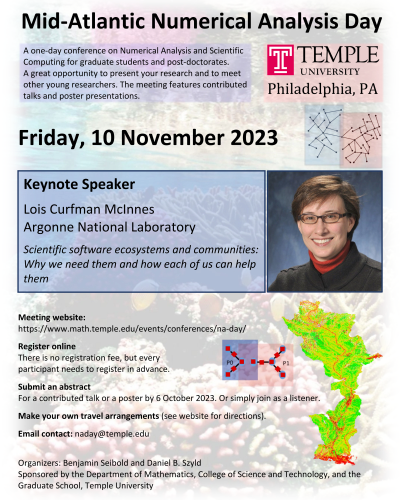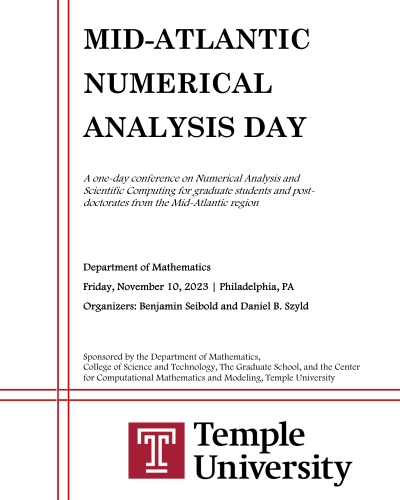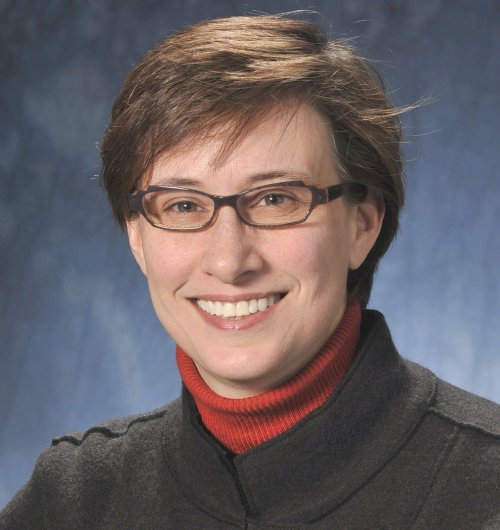The Conference
This one-day meeting will start at 10am to allow same-day travel.
It will be held in Room 617 Wachman Hall, Temple University, 1805 North Broad Street, just north of Montgomery Avenue.
It is an opportunity for graduate students and postdocs to present their research, and to meet other researchers.
There will be contributed talks and a poster session.
There is no registration fee, and no support for travel. Lunch will be provided.
We ask every participant to please register in advance, even if they are not planning to give a talk.
Keynote Speaker
|
Registration and/or Abstract Submission
If you would like to participate (in any form), please register using the online registration form.
Deadline for the submission of talks: October 6, 2023.
Conference Poster and Booklet
Conference Poster Click to download a PDF. |
Conference Booklet Click to download the conference booklet. |
Schedule
| 9:15-9:50 | Registration and breakfast (provided) |
| 9:50-10:00 | Opening remarks |
| 10:00-11:00 | Presentations (Discretization, Interpolation, Sampling) |
| 11:00-11:20 | Coffee Break |
| 11:20-12:00 | Presentations (Numerical Linear Algebra) |
| 12:00-1:30 | Posters and lunch (provided) |
| 1:30-2:30 | Keynote lecture (Lois Curfman McInnes) |
| 2:30-2:45 | Coffee break |
| 2:45-3:25 | Presentations (Model Reduction) |
| 3:25-3:45 | Coffee break |
| 3:45-4:45 | Presentations (Applications) |
| 4:45-5:55 | Closing remarks |
| 5:30-7:30 | Group dinner (attendance optional) |
Speakers
| Discretization, Interpolation, Sampling | ||||
|---|---|---|---|---|
| Guillaume | Bonnet | Univ. of Maryland, College Park | Monotone discretization of degenerate elliptic equations using Voronoi's first reduction of quadratic forms | |
| Richard Connor | Greene | NJIT | Efficient polynomial interpolation on the square and cube | |
| Shanyin | Tong | Columbia University | Large deviation theory-based adaptive importance sampling for rare events in high dimensions | |
| Numerical Linear Algebra | ||||
| Sarah | Gift | Drexel University | Real factorization of PSD matrix polynomials | |
| Andrew James | Higgins | Temple University | Analysis of randomized Householder-Cholesky QR | |
| Model Reduction | ||||
| Sean Joseph | Reiter | Virginia Tech | Generalizations of data-driven balancing: What do you need to sample for different balancing-based reduced models? | |
| Michael S. | Ackermann | Virginia Tech | Frequency-based reduced order models from purely time-domain data | |
| Applications | ||||
| Qinying | Chen | University of Delaware | 2D fluid model and simulations for evaporation driven tear film thinning | |
| Kiera Eloise | Kean | Temple University | Moment methods for advection on networks and applications in life cycle models | |
| Rujeko | Chinomona | Temple University | StaRMAP: Simple, efficient, and flexible simulation software for radiation transport | |
Posters
| Ahmet Kaan | Aydin | University of Maryland Baltimore County | Several robust model reductions for the boundary feedback stabilization of fully magnetic piezoelectric smart beams | |
| Luke | Evans | Flatiron Institute | Target measure diffusion maps: Sharp error analysis and spatial subsampling | |
| Gabriel | Provencher Langlois | New York University | Robust sparse regression using Hamilton-Jacobi equations, gradient inclusions and screening rules | |
| Jiaxing | Liang | University of Maryland, College Park | Efficient computational algorithms for magnetic equilibrium in a fusion reactor | |
| Rishad Islam | Shantho | Lehigh University | Analysis of exact and approximate map for linear systems arising in discretized PDEs | |
| Nour Jacob Mengsha Nicole |
Khoudari Woods Yao Zalewski |
Temple University | Swarming and instabilities in multi-agent systems |
Accommodation
Make your own arrangements. Please feel free to contact us for information on accommodation.
Contact
Email: naday -at- temple.edu
Organizers
Benjamin Seibold and Daniel B. Szyld
Sponsors
Sponsored and supported by the Department of Mathematics, the College of Science and Technology, the Graduate School, and the Center for Computational Mathematics and Modeling, Temple University.

